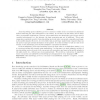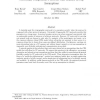106 search results - page 13 / 22 » Trusted Multiplexing of Cryptographic Protocols |
IACR
2011
12 years 7 months ago
2011
A zero-knowledge protocol allows a prover to convince a verifier of the correctness of a statement without disclosing any other information to the verifier. It is a basic tool a...
FOCS
2004
IEEE
13 years 11 months ago
2004
IEEE
A desirable goal for cryptographic protocols is to guarantee security when the protocol is composed with other protocol instances. Universally Composable (UC) protocols provide th...
SACRYPT
2005
Springer
14 years 29 days ago
2005
Springer
The ability to link two different sightings of the same Radio Frequency Identification (RFID) tag enables invasions of privacy. The problem is aggravated when an item, and the ta...
HPDC
2010
IEEE
13 years 8 months ago
2010
IEEE
Data is routinely created, disseminated, and processed in distributed systems that span multiple administrative domains. To maintain accountability while the data is transformed b...
ASIACRYPT
2001
Springer
14 years 3 hour ago
2001
Springer
Threshold cryptosystems and signature schemes give ways to distribute trust throughout a group and increase the availability of cryptographic systems. A standard approach in design...


